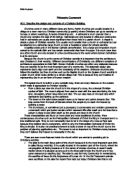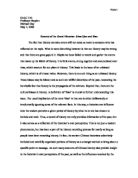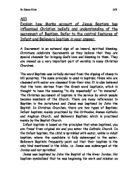Heaven and Hell - general views, traditional and liberal Christian views.
Heaven and Hell And Life after Death Heaven: General knowledge, Traditional and Liberal Christian views: Many people said that Heaven is not on earth. "My kingdom is not of this world...this realm". There is also a belief that if you are good, you will have an everlasting life with God, and because heaven provides everlasting life, it also offers and provides everlasting comfort (emotional) no mourning or crying. It is also believed that heaven is a beautiful place, where you can see arc angels, angels, saints and your loved ones who passed away before you. However, heaven is also based in faith. It is believed that when someone dies, they will cross over from death to life. Some teachings suggests that, form a human body, it will change into spiritual body to inherit the kingdom of God. "Earth to earth, ashes to ashes, dust to dust: insure and certain hope of the resurrection to eternal life through our Lord Jesus Christ, who died, was buried and rose again" (Funeral service). This shows that by the time that humans are going to die, they will turn into ash again from where they come from. That is why some people were cremated because of their belief that they will have to go back from where they came from. This phrase suggests that, we came from dust and we have to return to dust. However, some ethnic groups like the Jews chose not to be cremated, instead they want
Plato on Epistemology
How do I know what I know? Question 1: Which main questions, concepts, and theories of epistemology are dealt with by your selected philosopher? As a rationalist, Plato challenges inquiries of "what we know how we know" by centralizing the human mind (conscience and thought) as the essence of knowledge. Plato often debates using his deceased mentor, Socrates, to honour Socrates' reputation as a valuable teacher. True knowledge can be rediscovered deep within the mind; otherwise known as the World of Forms. He shows evidence of innate ideas in Platonic Doctrine of Recollection. In Plato's book Republic he writes about the distinctions between knowledge and personal opinion. He uses numerous concepts and metaphors such as metaphor of the sun, the divided line, and the Allegory in the Cave. Plato theorized that seeking knowledge is independent from the physical world (world perceived by senses), there are two distinct worlds that reflect each other. "The domain where truth and reality shine resplendent," (http://en.wikipedia.org/wiki/Metaphor_of_the_sun) is the World of Forms, Plato predicts, which is within your mind and sustains perfection; whereas, our sensory perception is linked to the visible world (the physical world). In the physical world of changing objects Plato sees it as "Everything in this world is always becoming something else, but nothing permanently is."
Philosophy Coursework
Philosophy Coursework AO1: Describe the design and contents of a Christian Building. Churches come in many different sizes and forms. Parish churches are usually located in a village or a town near to a Christian community (a parish) where Christians can go to worship on Sunday or attend weddings, funerals christenings etc... A cathedral is much grander than a church and contains the seat of the bishop. Cathedrals are only located in cities and ceremonies held in cathedrals are usually more significant than those held in a parish church. A chapel is simply a place of Christian worship. It is usually much smaller than a church or cathedral but can be attached to a cathedral, large church or even a hospital or prison for private worship. A basilica exists only in the Roman Catholic denomination. It is a large and important church central to the catholic faith and has certain ceremonial rites from the pope. It is much rarer than any other church and only located in a few countries around the world where Roman Catholicism is at its strongest. Because the church is at the centre of Christian worship it is important that the architecture aids Christians in their worship. Different denominations of Christianity use different variations of architecture appropriate to their faith. Roman Catholic churches are often very elaborate because they are deemed to be the most important
Sima Qian and Bias
EALC 110 Professor Hayden Michael Day May 1, 2008 Records of the Grand Historian: Sima Qian and Bias The fact that history contains errors will not come as news to someone who has reflected on the topic. What is more disturbing however is that our history may be wrong and that there are great gaps in it. Maybe we have failed to record and gather the events that make up the fabric of history. It is little events, strung together and accumulated over time, which account for our place in history. This leads to the issue of an unbiased history, which is of utmost value. However, there is no such thing as an unbiased history. These biases may be blatant and as such are willful distortions of the past, resonating the inevitable fact that history is the propaganda of the winners. Beyond that, there are the cultural biases in history. A definition of "bias" is crucial to further understanding this issue. The usual implication of the term "bias" is that one is either deliberately or involuntarily ignoring some of the relevant facts. In this way, a historian can influence how the readers perceive a given period of history by what he or she has chosen to include and omit. Thus, a record of history not only provides information of the past, but it also serves as a reflection of the historian's own perceptions. This is not just a modern phenomenon, but has been a part of the history
Mencius and Xunzi on Cultivation
EALC 110 Professor Hayden Michael Day March 13, 2008 Cultivation and Transformation: Mencius and Xunzi on Human Nature Confucius inspired a humanistic and ethical outlook that was developed further by prime disciples Mencius and Xunzi. This development took place amidst the background of arguments against other thinkers or in response to their criticisms of Confucianism. However, there was a disagreement within the Confucian school, as well, as shown by Xunzi's critique of Mencius. It may be perceived that Mencius has the dominant position in the Confucian tradition as Mencius's belief that human nature is originally good has often been interpreted into certain sayings of Confucius. Additionally, Xunzi's claim that human nature is "evil" and that people can be transformed to become good may be inconsistent, as they imply Mencius's claim that human nature is inherently good. For this reason, it is crucial to analyze both thinkers separately as integration of one thinker's original thought to another may obscure the important aspects of the assimilated thinker's position. Secondly, this method of analysis will show that the debate is not one conducted from extreme opposites as it may seem at first sight, for both Mencius and Xunzi agreed that man must cultivate his goodness consciously regardless of whether he is born with it or acquires it from the state. The differences
Platonic Forms
As Philosophy of Religion Ancient Greek Influences on religious philosophy a) Explain the Platonic concept of "forms". (25) Plato was a Greek philosopher who came up with the analogy of the cave. He basically said that we all live in a cave and we can only see the shadows of reality but not reality itself. He states education will enable us to leave the cave and to see the real world, even if we don't believe in the real world, it exists. He believed that physical objects possessed an entity of form which you could try and understand by separating the image of objects in our mind that we know through our senses and the image of a perfect form of the object. The closer we come to identifying the form, the closer we become to reality, but we are still all trapped in the dark cave. The idea of forms. He believed that the world we live in is a material world and we see imperfect copies of ideal forms. But there is also another eternal world which consists of concepts and forms. It is more real than the world we experience through our senses, and it is the object of knowledge not opinion. He said that the world of sense experience is subject to constant change. For example a leaf that was green yesterday could be brown today, and a boy may be five feet tall now who was two inches shorter some months ago. But the colour brown itself cannot become the colour green, and the
Science and Religion do they have anything to offer each other?
Transfer-Encoding: chunked CWK Science and Religion – do they have anything 28th December to offer each other? Religion and Science are both ways in which for thousands of years humans have explained theories of how things have come to be, and within recent centuries scientific explanations have evolved with the likes of Darwin and Newton proving things without the aid of Religion. Before scientific discoveries became what they are today, most people turned to Religion to explain things such as natural disaster, for example disease. Today some people choose either Science or Religion to explain theories such as the origin of the universe, but for the majority of people this shouldn’t be the question, it shouldn’t be ‘choose either one’. I don’t think so, and feel that there is room for both in this modern world that we happen to live in. Rather, I think we should ask what each has to offer one another, which is what I’ll be discussing in this essay. William Paley was a natural theist, and believed that science and religion were compatible and had more than just a passing resemblance. He believed that the scientific world and the religious world were both on the same sort of wavelength; they were both on the same track, they were both looking for the same answers, although coming at the same questions from different angles. He is renowned for
Religious Landscape in Australia Post 1945
St Mary's Cathedral College HSC Course Studies of Religion II Research Assignment: Religious Landscape in Australia Post 1945 The religious landscape in Australia is diverse and changing. Many aspects of this landscape have changed since 1945 through to the present, some of these include: denominational switching, the rise of new age religions and secularism. In addition to this, the notion of non-religion has been a growing reality for many Australians; this can be explored through an observation of humanism. Each of these aspects has helped to shape Australia's present religious landscape. Denominational switching is a phenomenon that has occurred largely in the Christian religious tradition. It involves people (usually young people) moving to another denomination under the same umbrella of a single religious tradition (for example, a Catholic believer joining the Assemblies of God). 'Switchers' usually move over to more modern, Pentecostal denominations, such as Hillsong (an Australian branch of Assemblies of God). The vast majority of people that change denominations are young people between the ages of 15 and 24. This trend has increased over that last ten years, as shown in the 1996, 2001 and 2006 census data. Over the 10-year period from 1996 to 2006, traditional Christian denominations have seen a decline in 15 - 24 year olds whereas Pentecostal denominations have
Explain the meaning and significance of Baptism for Christians today with particular reference to how being baptised might affect the behaviour, lifestyle and decision making of Christian believers today.
A01 Explain how Marks account of Jesus Baptism has influenced Christian beliefs and understanding of the sacrament of Baptism. Refer to the central features of Infant and Believers baptism in your answer. A Sacrament is an outward sign of an inward, spiritual blessing. Christians celebrate Sacraments as they believe that they are special channels for bringing God's love and blessing to them. They are viewed as a very important part of worship in many Christian Churches. The word Baptism was initially derived from the dipping of sheep to kill parasites. The same principle is used in baptism; those who are cleansed with water are cleansed from their sins. It is also believed that the term derives from the Greek word baptizein, which is thought to have the meaning "to dip repeatedly" or "to immerse". The Christian sacrament of baptism is the service by which people become members of the Church. There are many references to Baptism in the scriptures and Jesus was baptised by John the Baptist. In Christian Churches, there are two types of Baptism; Infant baptism; mainly practised by the Orthodox, Roman Catholic and Anglican Church, and Believers Baptism; which is practised mainly by the Baptist Church. Infant baptism is based on the principles that when baptised, you are freed from original sin and you enter the Catholic Church. In the Infant baptism, the child is sprinkled
Usefulness of Philosophy
Philosophy of Discipline Philosophy is to be studied, not for the sake of any definite answers to its questions, since no definite answers, can, as a rule, be known to be true, but rather for the questions themselves. -- BERTRAND RUSSELL Zhao Yue (34) 3.11 Elisha What is philosophy? It is a question troubling the philosophers ever since philosophy was first studied. That is a question we cannot answer, but we do know that philosophy will guide us to the quest for knowledge. The knowledge of philosophy can enhance analytical, critical and interpretive capacities that are applicable to any subject-matter. When we read Japanese Manga, we often see the characters cry out the question "Why?" We would often only be told of how the Manga characters were able to advance not because they found the answer to the question but realized that to answer these questions, they have to work harder. This is the basic form of philosophy. The questions are, of course, never answered, but the process of trying to answer them is the beginning of knowledge. The current generation of youth, such as ourselves, are obsessed with finding answer to everything as a result of today's education system. Indeed, the subjects taught in school: Languages, Mathematics, Sciences and Humanities, all require us to obtain the answer in order to pass the exam. Those who focus their mind and soul to getting the











